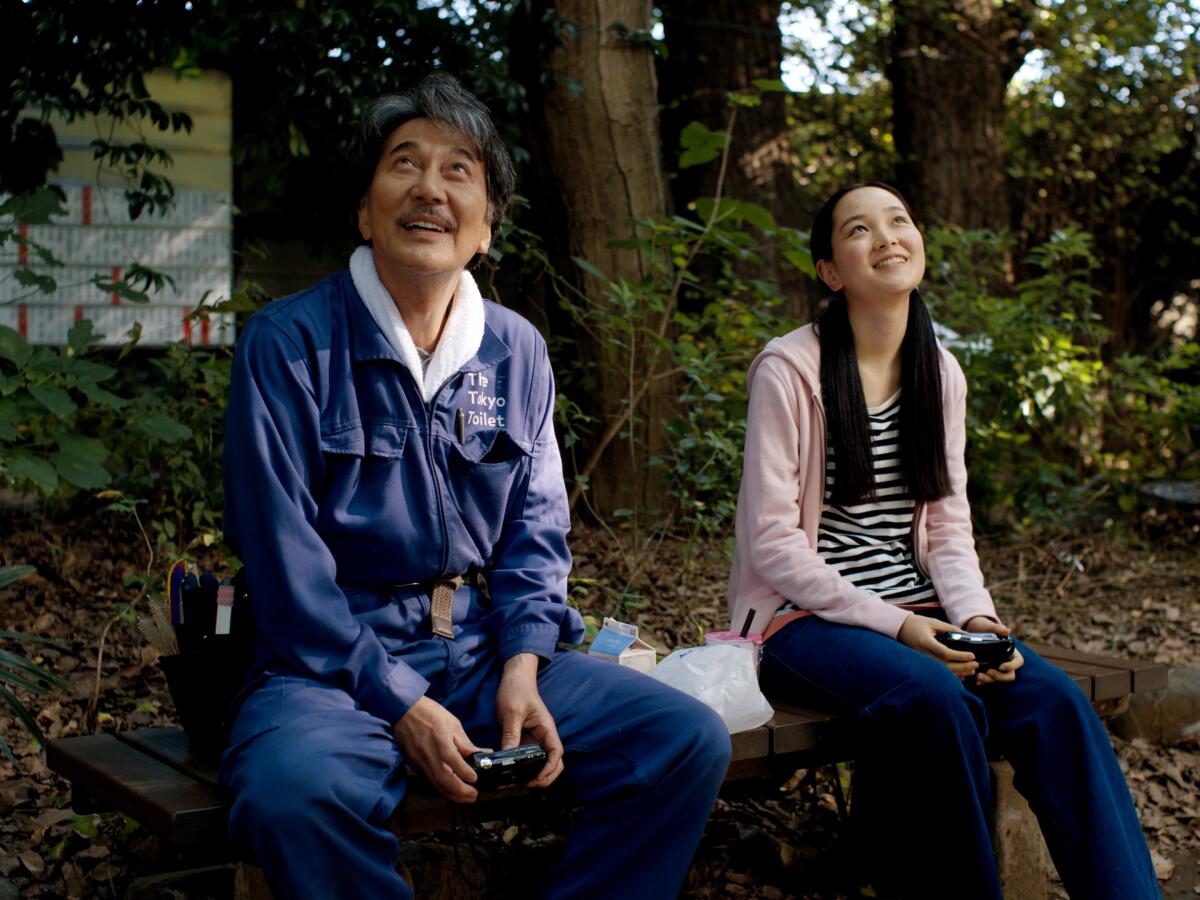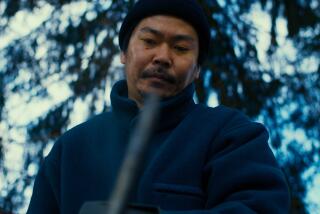Review: In the exquisite ‘Perfect Days,’ a city worker’s daily routine approaches the profound

- Share via
A banal daily routine reveals hidden depths in the Tokyo-set gem “Perfect Days,” from one of cinema’s great poets of patience and connection, Wim Wenders. A beautifully observed paean to caretaking — both physical and philosophical — the movie is led, with sublime joy, by the great Japanese actor Koji Yakusho (“Shall We Dance?”), whose character, Hirayama, is a solitary man at uncommon peace with his chosen existence. In the pantheon of films about people and their jobs, “Perfect Days” suggests a riff on the iconic “Superman” tagline: You’ll believe a man can enjoy cleaning public toilets.
The facilities in question are, to be fair, eye-catching, the result of a real-life hospitality initiative called the Tokyo Toilet that enlisted Japan’s leading architects to design diverse, aesthetically appealing restrooms that now dot the parks, streets and crannies of the trendy Shibuya district. One bathroom resembles a cluster of mushrooms, another a woodsy enclave. (“Barbie” isn’t the only Oscar nominee this year to find artistic purchase in a case of brand management.)
But if anyone were to find that sweet spot in between a product being sold and a feeling being conveyed, it would be Wenders. The German auteur, in an Ozu frame of mind (the Japanese master is one of his filmmaking idols), brings to bear his considerable skill with visual simplicity and isolation’s strange allure, crafting a glimpse at two weeks in which a modest life achieves an immeasurable grace.
Wim Wenders is enjoying a peak moment with two new films, the documentary ‘Anselm’ and the fictional drama ‘Perfect Days.’
We’re with Hirayama when he awakens to the sounds of street sweeping. He brushes his teeth, sprays his plants, dons his jumpsuit and plays cassettes of classic rock in his van on the way to work. We watch him scrub, wipe and mop. He also helps a lost child, endures the chatter of a young co-worker (Tokio Emoto) and takes pictures of treetops on his lunch break. We see Hirayama after his shift too: bicycling at twilight, scrubbing down at a bathhouse, grabbing dinner at a favorite spot, then reading before bed.
When there are variations to his ritual, he adapts, and in those pivots, we glean a little more. Not that much more, however. Only when his teenage niece, Niko (Arisa Nakano), visits unexpectedly for a few days do we realize that this wiry, graying gentleman has left an entire life behind, willfully. We don’t learn any particulars, because Wenders prefers that we grapple with the life that Hirayama has found now. Mind you, what that is isn’t spelled out much, either.
But the exquisite pleasure of Yakosha’s near-silent, Cannes-honored performance is that it always feels as if he’s communicating it to us anyway, through the beating heart of a contented soul and a smile in his eyes sparked by what we sense only he can see. (If you stay past the credits, however, you’ll learn a Japanese word for what that ephemeral feeling is.)
Multiple nominations for Justine Triet’s “Anatomy of a Fall” and Jonathan Glazer’s “The Zone of Interest” are the most heartening developments for the academy in years.
I don’t think I’m spoiling or depreciating the loveliness of “Perfect Days” when I say that it’s very much the work of an older director. Not in terms of energy (of which there’s plenty), but rather an experienced attitude. Where Wenders’ unforgettable road movies of yore (“Kings of the Road,” “Paris, Texas”) wandered memorably in contemplating our place in the world, this film beams and buzzes inside its closed loop with the hard-won wisdom of acceptance. And it does so while staying in awe of what can never be understood, only appreciated — and if we’re lucky, enjoyed.
That outlook is brilliantly encapsulated at the end too. It’s a gloriously extended moment, Franz Lustig’s camera looking dead on at our protagonist behind the wheel, his face lighted by dawn, poignantly roiling with emotions. Nina Simone’s deeply lived voice sings about the coming new day and feeling good.
'Perfect Days'
In Japanese with English subtitles
Rating: PG, for some language, partial nudity and smoking
Running time: 2 hours, 3 minutes
Playing: Now in limited release
More to Read
Only good movies
Get the Indie Focus newsletter, Mark Olsen's weekly guide to the world of cinema.
You may occasionally receive promotional content from the Los Angeles Times.












